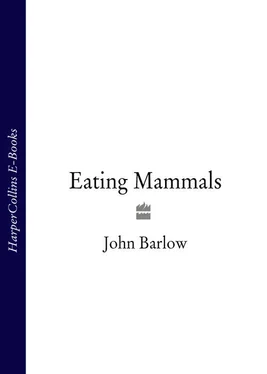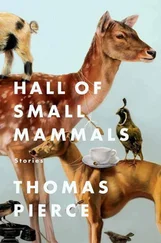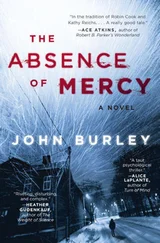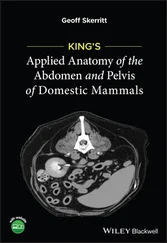On he went, and as the list became more and more preposterous, my astonishment and incredulity grew in equal measure. This man, I told myself, was not only mad but also a great fabulist. However, I must tell you, before we go any further, that The Great Michael Mulligan was, in recounting these stories, very far from invention, for the truth was that he had eaten things far more extraordinary, more extraordinary indeed than he dared mention.
But how, you ask, can a man chew his way through a boot, or a raincoat? How, come to that, could he possibly sit down to a chair? Well, you yourself probably possess all that is necessary to achieve such a feat. A mincer, and a good dose of oil is all that you need. Mulligan had begun with a small kitchen mincer, to which he had fitted the finest, most durable blades available, and which was quite adequate for turning all manner of small items into an ingestible mince. With the addition of larger and more powerful machinery, the toughest boot could easily be turned to a leathery crumb. And is that so hard to stomach? Have you never heard of Peter Schultz, or Jean-Paul Kopp? The former ate a Mercedes-Benz, the latter a biplane. Both employed the simple expedient of filing and grinding away slowly at the object in question, swallowing the resulting dust little by little along with a suitable internal lubricant. The aeroplane sounds impressive, no doubt, but it was really only a matter of time, and in the two years it took from propeller to tail fin, Mr Mulligan would have eaten his way through enough household items to furnish a decent sized parlour.
Over the years the great man designed a number of hand-operated grinders, with higher and higher gearing ratios, so that, along with the toughest and best grinding blades available, he was capable of turning wood into sawdust and small amounts of worked metal into perfectly edible filings. He never touched glass (although some did), but he was occasionally tempted by a china cup and saucer, or a particularly fine dinner plate.
‘All of which explains my need for the mixture which you so expertly prepared,’ he said, drawing his story to a close. He examined his pocket watch and stood up. ‘You see, my friend, I really am going to eat a chair this evening. For Freemasons, I’m afraid, dullards to the last, but times are hard. And now I must prepare.’
He smoothed the velvet of his waistcoat down the vast, arcing curve of his stomach and went over to his jacket. I bade him goodnight and, with my head full of the most extraordinary tales of gluttony, as well as the effects of my first cigar, I wandered out of his room. I forgot my pound note and made my way back down to the kitchens quite without knowing which route I took, so immersed was I in a thousand new turns of the imagination.
That was my first stroke of good fortune: a chance meeting with a true king of his craft, a maestro fêted the world over, The Great Michael ‘Cast Iron’ Mulligan.
When I arrived back in the kitchens, I found the place unusually quiet. Dinner preparations were being conducted in a strangely subdued manner: hard beating had become feather-light whisking, brusque chopping replaced by slow, painstaking slicing, all eyes turned downwards. Either someone had died, I thought, or someone had got the sack.
At that moment I heard a crash nearby. I looked down; a metal bucket lay at my feet. I realised, rather too late, that I had abandoned it in my room. Immediately I deduced the source of the abnormal quiet. Chef, from whose hand the bucket had fallen, knelt down and ran his finger around the inside of it. He closed his eyes in mock appreciation as he sampled the sweet, oily mixture. Then he stood up and faced me. He was a big man, but I was bigger. In a kitchen, though, physical size is of little consequence, as well I knew.
‘Three questions,’ he said as a sharp, aching silence fell around us. ‘One: have you by any chance read tonight’s menu?’
Instead of pronouncing the sentence with its appropriate interrogative intonation, though, he punctuated his delivery with a cuff to the side of my head, delivered with the full power of his considerable upper body. My ear crackled and buzzed, and immediately half my head began to numb over. Of course, I had not read the menu, yet I had little doubt that it included recipes proclaiming their citrus content, or their basis in finest Italian olive oil.
‘Two: did you use the whole bottle of oil?’
The singular form sang out ominously for me. I began a forlorn nod, but even as my head dipped for the first time I felt my jaw rocket back upwards, as his forearm swung into my face, my teeth slamming together with a sliver of tongue still between then. I felt no pain, but, incredibly, a slight sense of relief that I had already survived two out of three.
‘And finally,’ he shouted, breaking into an exaggerated goose-step and circling me several times, ‘DO YOU KNOW WHERE THE FUCKING LABOUR EXCHANGE IS?’
He bawled it into my ear from behind me and then, grabbing me by the collar, pulled me off balance and punched me three times in the back of the head as I went down.
Then nothing. And even from the floor I could detect quite clearly the horrified stillness in the kitchen, spatulas sinking unattended into batter, whisks suspended in mid-air, dripping half-beaten egg on to the floor. The blood ran cold from the side of my mouth, almost as cold as the icy floor onto which it trickled, and then the various sites of localised injury began to get their screaming messages through to my brain.
‘We need that veal stock in five minutes, eh!’ Chef called out suddenly, breaking the silence. Back came a clipped reply. And things returned to normal. Some of my colleagues threw me sympathetic glances as they stepped over my crumpled, aching body. But no one offered assistance.
By slow, agonising degrees, I made my way to the door, and got myself to a low crouch. Then, as I stumbled out of the kitchen, a young trainee who I had come to know hopped out after me, making sure nobody had seen him, and asked: ‘What did you do with it? Everybody wants to know, especially Chef. It’s been driving him mad, but he’s too proud to ask. What the hell were you cooking?’
It was a second or two before I recalled.
‘Mulligan!’ I said, more to myself than to my friend.
‘What?’
‘Le Grand Michael Mulligan! I cooked him a chair!’
I reached his room just as he was about to leave. He ushered me back inside and helped to clean my blood-smeared face. I attempted to explain what had happened, despite my damaged tongue, and then, suddenly, as he dabbed my chin with a damp towel, he furrowed his brow as if something striking had occurred to him.
‘My word!’ he said, patting first the top of my head and then his own, ‘you’re almost my height! Not as broad, naturally, but, by Jiminy, you’re no stripling either!’
With that he dashed over to the wardrobe, pulled out a black dinner suit and threw it at me.
‘Put that on, my boy, and forget your woes. You’re coming with me!’
With not a moment’s hesitation I changed into the suit. It hung about me like an untethered tent, but the length was not too far off the mark, and all in all it lent me an almost eccentric aspect.
‘The car’s ready,’ he said, lighting another cigar and consulting his watch. ‘Tonight, you will be, let’s see … Captain Gusto! Yes, that’s it! Captain Gusto, assistant to The Great Michael Mulligan!’
And that was the second stroke of good fortune to befall me that day: to be beaten senseless by a furious chef and, as a consequence, to be invited by Mulligan, the great man himself, to share the stage for his most enduring act.
The car was a shining Rolls-Royce. I climbed inside, and Mulligan backed his ample frame in through the opposite door and on to the driver’s seat, which had the appearance of being rather flatter and less bouncy than the others in the car, somewhat like an over-egged sponge that has risen enthusiastically and then turned sad in the oven.
Читать дальше












